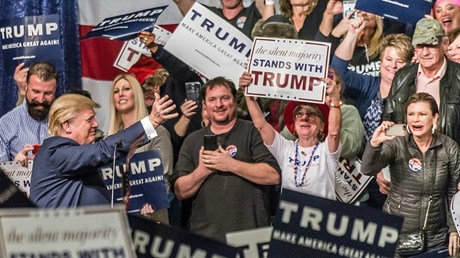Four words that reveal what his followers really believe.

I am not a politician, but a minister who teaches theology. As a citizen of this great republic, I have convictions about domestic and foreign policy, but none of that qualifies me to join the fray of political experts and pundits. I am qualified, however, to engage the topic of significant support among self-identified “evangelical voters” for Donald Trump and what this means, not for the country but what it suggests about significant segments of the US church.
While a theological analysis of other candidates would suggest many equally troubling assumptions of their evangelical followers, no candidate is more identified with the word evangelical as is Trump. The loyalty of his self-identified evangelical followers is especially startling to many.
Let me suggest that the slender thread connecting Trump to the church is his occasional holiday appearances at Marble Collegiate Church, made famous by its pastor for 52 years, Norman Vincent Peale. Blending pop-psychology and spirituality, Peale’s The Power of Positive Thinking (1952) remained on The New York Times bestsellers list for 186 weeks. Nicknamed “God’s Salesman,” Peale was criticized for trivializing Christianity. Reinhold Niebuhr said that he “corrupts the gospel,” and that he helps people “feel good, while they are evading the real issues of life.”
In the 1952 election, Peale declared presidential candidate Adlai Stevenson unfit because he was divorced. For his part, Stevenson quipped, “Speaking as a Christian, I find Paul appealing and Peale appalling.” During the Kennedy-Nixon campaign, which began his long relationship with the Nixon White House, Peale declared, “Faced with the election …
Source: Christianity Today Most Read